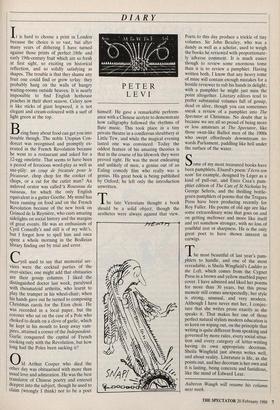DIARY
PETER LEVI Being fussy about food can get you into trouble though. The noble Utopian Con- dorcet was recognised and promptly ex- ecuted in the French Revolution because he went to a restaurant and asked for a 12-egg omelette. That seems to have been a period of ferocious word-play as well as axe-play: un coup de fricassee pour le fricasseur, chop chop for the cooker of chops, or a cut for the cutlet man? An unloved orator was called 'a Rousseau du ruisseau, for which the only English equivalent is a gutter Goethe. My mind has been running on food and on the French Revolution because of the new book on Grimod de la Reyniere, who casts amazing sidelights on social history and the margins of great events. He was an enthusiasm of Cyril Connolly's and still is of my wife's, but I forgot how to spell him and once spent a whole morning in the Bodleian library finding out by trial and error.
Cyril used to say that memorial ser- vices were.the cocktail parties of the over-sixties; one might add that obituaries are their gossip columns. I liked the distinguished doctor last week, paralysed with rheumatoid arthritis, who learnt to play the trumpet in his wheel-chair; when his hands gave out he turned to composing Christmas carols for the Eton choir. He was recorded M a local paper, but the coroner who sat on the case of a Pole who choked to death on a clove of garlic, which he kept in his mouth to keep away vam- pires, attained a corner of the Independent. Garlic conquered the capital of French cooking only with the Revolution, but how long had the Poles been sucking it?
Old Arthur Cooper who died the other day was obituarised with more than usual love and admiration. He was the best translator of Chinese poetry and entered deepest into the subject, though he used to claim (wrongly I think) not to be a poet himself. He gave a remarkable perform- ance with a Chinese acolyte to demonstrate how calligraphy followed the rhythms of flute music. This took place in a tiny private theatre in a coniferous shrubbery at Little Tew, and while the magical evening lasted one was convinced. Today the oddest feature of his amazing theories is that in the course of his lifework they were proved right. He was the most endearing and unlikely of men, a genius out of an Ealing comedy film who really was a genius. His great book is being published by Oxford; he left only the introduction unwritten.
The late Victorians thought a book should be a solid object, though the aesthetes were always against that view Poets to this day produce a trickle of tiny volumes. Sir John Beazley, who was a dandy as well as a scholar, used to weigh the books he reviewed with proportionate- ly adverse comment. It is much easier though to review some enormous tome than it is to review a pamphlet. Having written both, I know that any heavy tome of mine will contain enough mistakes for a hostile reviewer to rub his hands in delight; with a pamphlet he might just miss the point altogether. Literary editors tend to prefer substantial volumes full of gossip, dead or alive, though you can sometimes sneak a review of a pamphlet into The Spectator at Christmas. No doubt that is because we are all so proud of being more or less amateurs at The Spectator, like those swan-like Balliol men of the 1900s who swept effortlessly downstream to- wards Parliament, paddling like hell under the surface of the water.
Some of my most treasured books have been pamphlets, Eluard's poem Tecris ton nom' for example, designed by Leger as a kind of pull-out, and Enzo Crea's pam- phlet edition of The Cats of St Nicholas by George Seferis, and the thrilling bottle- green pamphlets of poems that the Tregara Press have been producing recently for Roy Fuller. His poems of old age are like some extraordinary wine that goes on and on getting mellower and more like itself and yet somehow stronger, with no loss of youthful zest or sharpness. He is the only great poet to have shown interest in earwigs.
The most beautiful of last year's pam- phlets to handle, and one of the most rereadable, is Sheila Wingfield's Ladder to the Loft, which comes from the Cygnet Press in a brown and yellow marbled paper cover. I have admired and liked her poems for more than 30 years, but this prose memoir still comes unexpectedly; her style is strong, unusual, and very modern. Although I have never met her, I conjec- ture that she writes prose exactly as she speaks it. That makes her one of those perfect natural stylists modern education is so keen on wiping out, on the principle that writing is quite different from speaking and governed by more rules, every social situa- tion and every category of letter-writing having its own appropriate decorum. Sheila Wingfield just always writes well, and about reality. Literature is life, as she points out, and her decorum is her own and it is lasting, being concrete and fastidious, like the mind of Edward Lear.


















































 Previous page
Previous page